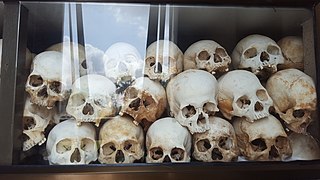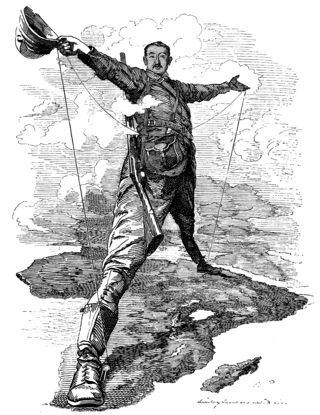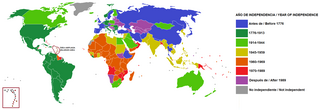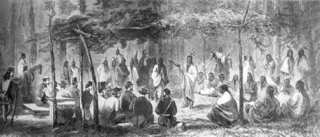Related Research Articles

Cultural imperialism comprises the cultural dimensions of imperialism. The word "imperialism" describes practices in which a country engages culture to create and maintain unequal social and economic relationships among social groups. Cultural imperialism often uses wealth, media power and violence to implement the system of cultural hegemony that legitimizes imperialism.

Colonialism is the exploitation of people and of resources by a foreign group. Colonizers monopolize political power and hold conquered societies and their people to be inferior to their conquerors in legal, administrative, social, cultural, or biological terms. While frequently advanced as an imperialist regime, colonialism can also take the form of settler colonialism, whereby colonial settlers invade and occupy territory to permanently replace an existing society with that of the colonizers, possibly towards a genocide of native populations.

Genocide is violence that targets individuals because of their membership of a group and aims at the destruction of a people.

Imperialism is maintaining or extending power over foreign nations, particularly through expansionism, employing both hard power and soft power. Imperialism focuses on establishing or maintaining hegemony and a more or less formal empire. While related to the concepts of colonialism, imperialism is a distinct concept that can apply to other forms of expansion and many forms of government.

Decolonization is the undoing of colonialism, the latter being the process whereby imperial nations establish and dominate foreign territories, often overseas. The meanings and applications of the term are disputed. Some scholars of decolonization focus especially on independence movements in the colonies and the collapse of global colonial empires.

Western European colonialism and colonization was the Western European policy or practice of acquiring full or partial political control over other societies and territories, founding a colony, occupying it with settlers, and exploiting it economically. For example, colonial policies, such as the type of rule implemented, the nature of investments, and identity of the colonizers, are cited as impacting postcolonial states. Examination of the state-building process, economic development, and cultural norms and mores shows the direct and indirect consequences of colonialism on the postcolonial states. It has been estimated that Britain and France traced almost 50% of the entire length of today's international boundaries as a result of British and French imperialism.
The genocide of indigenous peoples, colonial genocide, or settler genocide is the elimination of indigenous peoples as a part of the process of colonialism.

Settler colonialism is a logic and structure of displacement by settlers, using colonial rule, over an environment for replacing it and its indigenous peoples with settlements and the society of the settlers.

Anthony Dirk Moses is an Australian scholar who researches various aspects of genocide. In 2022 he became the Anne and Bernard Spitzer Professor of Political Science at the City College of New York, after having been the Frank Porter Graham Distinguished Professor of Global Human Rights History at the University of North Carolina at Chapel Hill. He is a leading scholar of genocide, especially in colonial contexts, as well as of the political development of the concept itself. He is known for coining the term racial century in reference to the period 1850–1950. He is editor-in-chief of the Journal of Genocide Research.
Settler colonialism in Canada refers to the process and effects of colonization on the Indigenous peoples of Canada. As colonization progressed, Indigenous peoples were subject to policies of forced assimilation and cultural genocide. Governments in Canada in many cases ignored or chose to deny the aboriginal title of First Nations. The traditional governance of many of the First Nations was replaced with government-imposed structures. Many Indigenous cultural practices were banned.

The connection between colonialism and genocide has been explored in academic research. According to historian Patrick Wolfe, "[t]he question of genocide is never far from discussions of settler colonialism." Historians have commented that although colonialism does not necessarily directly involve genocide, research suggests that the two share a connection.
Patrick Wolfe was an Australian historian and scholar.

Zionism has been described by several scholars as a form of settler colonialism in relation to the region of Palestine and the Israeli–Palestinian conflict. This paradigm has been applied to Zionism by various scholars and figures, including Patrick Wolfe, Edward Said, Ilan Pappe and Noam Chomsky. Zionism founders and early leaders were aware and unapologetic about their status as colonizers, Many early leading Zionists such as Ze'ev Jabotinsky in "The Iron Wall", described Zionism as colonization.
Lorenzo Veracini is a historian and professor at Swinburne University of Technology’s Institute for Social Research. He is the editor in chief of Settler Colonial Studies and has been a key figure in the development of the field of settler colonialism. His 2010 book Settler Colonialism: A Theoretical Overview was described as "comprehensive though succinct" and "probably the best justification of the imperative to view settler colonialism as significantly different from traditional or classical colonialism".

Denial of genocides of Indigenous peoples consists of a claim that has denied any of the multiple genocides and atrocity crimes, which have been committed against Indigenous peoples. The denialism claim contradicts the academic consensus, which acknowledges that genocide was committed. The claim is a form of denialism, genocide denial, historical negationism and historical revisionism. The atrocity crimes include genocide, crimes against humanity, war crimes, and ethnic cleansing.

Indigenous response to colonialism has varied depending on the Indigenous group, historical period, territory, and colonial state(s) they have interacted with. Indigenous peoples have had agency in their response to colonialism. They have employed armed resistance, diplomacy, and legal procedures. Others have fled to inhospitable, undesirable or remote territories to avoid conflict. Nevertheless, some Indigenous peoples were forced to move to reservations or reductions, and work in mines, plantations, construction, and domestic tasks. They have detribalized and culturally assimilated into colonial societies. On occasion, Indigenous peoples have formed alliances with one or more Indigenous or non-Indigenous nations. Overall, the response of Indigenous peoples to colonialism during this period has been diverse and varied in its effectiveness. Indigenous resistance has a centuries-long history that is complex and carries on into contemporary times.
Damien Short is a professor of human rights and environmental justice that works for the School of Advanced Study. He is also a co-director of the Human Rights Consortium. His research interests include colonialism, genocide, and ecocide.

The historiography of Indigenous genocide is the study of how these type of genocides have been documented and interpreted by historians throughout the colonial age up to today.

Many historians have argued that Indigenous Australians were victims of genocide, involving systematic and deliberate actions taken primarily by British colonists and their descendants aimed at eradicating Aboriginal and Torres Strait Islander cultures, languages, and people. Posited motivations for genocide varied, and included a desire to preserve a "white Australia", or assimilating Indigenous populations "for their own good".
References
- ↑ Crotty, Thomas (2018). "Beyond Genocide: a comparative analysis of the elimination of Australia's Indigenous and Torres Strait Islander people". NEW: Emerging Scholars in Australian Indigenous Studies: 32–37. doi: 10.5130/nesais.v2i1.1470 .
- ↑ Klein, Elise (2020). "Settler colonialism in Australia and the cashless debit card". Social Policy & Administration. 54 (2): 265–277. doi:10.1111/spol.12576. hdl: 11343/276832 .
- ↑ Veracini, Lorenzo (2007). "Historylessness: Australia as a settler colonial collective". Postcolonial Studies. 10 (3): 271–285. doi:10.1080/13688790701488155. hdl: 1885/27945 .
- ↑ Veracini, Lorenzo (2013). "'Settler Colonialism': Career of a Concept". The Journal of Imperial and Commonwealth History. 41 (2): 313–333. doi:10.1080/03086534.2013.768099.
- ↑ Strakosch, Elizabeth (2019). "The technical is political: settler colonialism and the Australian Indigenous policy system". Australian Journal of Political Science. 54 (1): 114–130. doi:10.1080/10361146.2018.1555230.